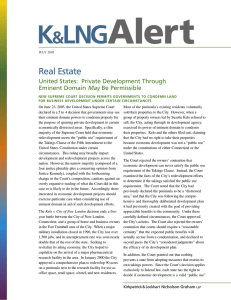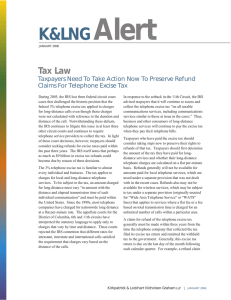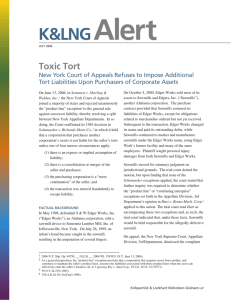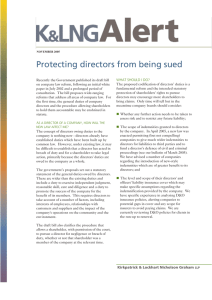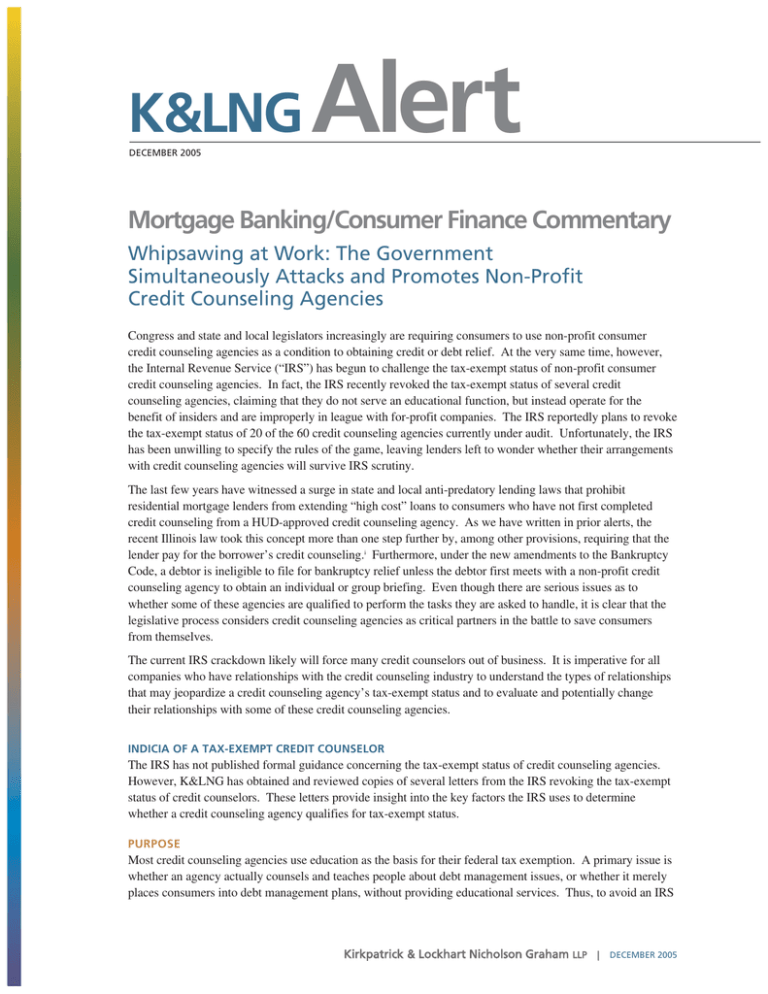
K&LNG
DECEMBER 2005
Alert
Mortgage Banking/Consumer Finance Commentary
Whipsawing at Work: The Government
Simultaneously Attacks and Promotes Non-Profit
Credit Counseling Agencies
Congress and state and local legislators increasingly are requiring consumers to use non-profit consumer
credit counseling agencies as a condition to obtaining credit or debt relief. At the very same time, however,
the Internal Revenue Service (“IRS”) has begun to challenge the tax-exempt status of non-profit consumer
credit counseling agencies. In fact, the IRS recently revoked the tax-exempt status of several credit
counseling agencies, claiming that they do not serve an educational function, but instead operate for the
benefit of insiders and are improperly in league with for-profit companies. The IRS reportedly plans to revoke
the tax-exempt status of 20 of the 60 credit counseling agencies currently under audit. Unfortunately, the IRS
has been unwilling to specify the rules of the game, leaving lenders left to wonder whether their arrangements
with credit counseling agencies will survive IRS scrutiny.
The last few years have witnessed a surge in state and local anti-predatory lending laws that prohibit
residential mortgage lenders from extending “high cost” loans to consumers who have not first completed
credit counseling from a HUD-approved credit counseling agency. As we have written in prior alerts, the
recent Illinois law took this concept more than one step further by, among other provisions, requiring that the
lender pay for the borrower’s credit counseling.i Furthermore, under the new amendments to the Bankruptcy
Code, a debtor is ineligible to file for bankruptcy relief unless the debtor first meets with a non-profit credit
counseling agency to obtain an individual or group briefing. Even though there are serious issues as to
whether some of these agencies are qualified to perform the tasks they are asked to handle, it is clear that the
legislative process considers credit counseling agencies as critical partners in the battle to save consumers
from themselves.
The current IRS crackdown likely will force many credit counselors out of business. It is imperative for all
companies who have relationships with the credit counseling industry to understand the types of relationships
that may jeopardize a credit counseling agency’s tax-exempt status and to evaluate and potentially change
their relationships with some of these credit counseling agencies.
INDICIA OF A TAX-EXEMPT CREDIT COUNSELOR
The IRS has not published formal guidance concerning the tax-exempt status of credit counseling agencies.
However, K&LNG has obtained and reviewed copies of several letters from the IRS revoking the tax-exempt
status of credit counselors. These letters provide insight into the key factors the IRS uses to determine
whether a credit counseling agency qualifies for tax-exempt status.
PURPOSE
Most credit counseling agencies use education as the basis for their federal tax exemption. A primary issue is
whether an agency actually counsels and teaches people about debt management issues, or whether it merely
places consumers into debt management plans, without providing educational services. Thus, to avoid an IRS
Kirkpatrick & Lockhart Nicholson Graham LLP |
DECEMBER 2005
challenge, a credit counseling agency should have a clear charitable purpose, which may be evidenced by the
agency:
■
Devoting a significant percentage of its budget and human resources toward educational services and
credit counseling rather than toward debt management plans;
■
Producing a wide variety of free or low-cost educational materials for low-income individuals or
families;
■
Offering both public education programs and individual training to consumers, in addition to published
materials;
■
Providing interactive counseling and educational services by well-qualified employees that are
customized to the needs and circumstances of each individual customer and that continue throughout the
duration of the relationship between the agency and the consumer; and
■
Routinely monitoring the interaction between counselors and consumers to ensure that the organization
is upholding its commitment to providing counseling and educational services.
MANAGEMENT
The IRS Commissioner recently stated that “too many [credit counseling agencies]…operate for the benefit of
insiders or are improperly in league with profit-making companies.” This concern might have arisen based on
the fact that many credit counseling agencies were first established by banks, lending institutions and various
private interests, and continue to maintain close ties with these parties. However, according to the IRS, a
credit counseling agency’s officers, directors and owners should maintain an arm’s-length relationship with
these organizations.
FUNDING
Traditionally, credit counseling agencies have been funded in large part through “Fair Share” programs, under
which creditors pay counseling agencies a percentage of the outstanding debt recovered from borrowers
through the credit counselors’ debt repayment plans. The IRS apparently believes that Fair Share programs
provide “substantial private financial benefit” to creditors and thus run counter to the charitable purposes of
the agencies. To address this issue, Fair Share arrangements should be scrutinized and, where appropriate,
credit counseling agencies may need to seek alternative means of funding. The theory underlying this position
—substantial private financial benefit to creditors—may call into question other financial arrangements
between creditors and non-profit credit counseling agencies.
Credit counseling agencies have historically supplemented their funding by charging their clients increased
fees for debt management plans. This practice, however, is also under IRS scrutiny. Credit counseling
agencies should consider the following:
■
Monitoring and keeping to a minimum the amount of revenue generated from any Fair Share
arrangements;
■
Restricting the amount of revenue generated by the sale and administration of debt management plans,
unless the credit counseling agency can demonstrate that its debt management plans are incidental and
integral to a substantial and substantive educational program; and
■
Soliciting grants and sources of income from disinterested members of the public and community.
SPENDING
Credit counseling agencies should limit the resources they invest in marketing debt management plans as a
solution to consumers’ credit problems. If a credit counselor offers debt management plans, it should consider
doing so for little or no cost and waiving fees for low-income individuals or families. Furthermore, credit
counseling agencies should limit expenditures for purchasing leads or referrals from third parties.
2
Kirkpatrick & Lockhart Nicholson Graham
LLP
|
DECEMBER 2005
In light of the recent events in the credit counseling industry, and to maximize the likelihood of surviving an
IRS examination, members of the mortgage banking industry should be prepared to review the business
practices of credit counselors with which they work. This may require making changes to those relationships
in order to facilitate arm’s-length relationships. It is anybody’s guess what this means in the context of the
new Illinois anti-predatory funding law that effectively requires lenders to pay non-profit credit counseling
agencies for the loans the lenders intend to make and from which they will financially benefit. Similarly, this
crackdown may call into question the various strategic relationships between the residential mortgage lending
industry and HUD-approved credit counseling agencies. With the encouragement of the mortgage lending
industry, perhaps the IRS will enumerate with more specificity the elements of a permissible relationship
between lenders and credit counseling agencies. In any event, it is ironic that the IRS effectively is seeking to
put non-profit credit counseling agencies out of business at the very same time that other government entities
are seeking to expand their role.
If you have any questions about this alert, please call either Stephen Barge (412.355.8330 /
sbarge@klng.com) or Christopher Cawley (412.355.8243 / ccawley@klng.com) about the related tax issues or Laurence E. Platt (202.778.9034 / lplatt@klng.com) about the related mortgage banking issues.
ENDNOTES
i
3
See K&LNG Mortgage Banking/Consumer Finance Commentary: “Regulatory Redlining: Illinois Encourages
Lenders to Abandon Cook County” by Laurence E. Platt, Nanci L. Weissgold, and Laura Johnson, August 15, 2005.
Kirkpatrick & Lockhart Nicholson Graham
LLP
|
DECEMBER 2005
MORTGAGE BANKING/CONSUMER FINANCE PRACTICE
Kirkpatrick & Lockhart Nicholson Graham LLP has approximately 1,000 lawyers who practice in offices located in Boston, Dallas,
Harrisburg, London, Los Angeles, Miami, Newark, New York, Palo Alto, Pittsburgh, San Francisco, and Washington. K&LNG represents entrepreneurs, growth and middle market companies, capital markets participants, and leading FORTUNE 100 and FTSE
100 global corporations, nationally and internationally.
For more information, please visit our website at www.klng.com or contact one of the lawyers listed below.
ATTORNEYS
Laurence E. Platt
Phillip L. Schulman
Costas A. Avrakotos
Melanie Hibbs Brody
Steven M. Kaplan
Jonathan Jaffe
H. John Steele
R. Bruce Allensworth
Daniel J. Tobin
Nanci L. Weissgold
Phillip John Kardis II
Stephen E. Moore
Stanley V. Ragalevsky
David L. Beam
Emily J. Booth
Krista Cooley
Eric J. Edwardson
Suzanne F. Garwood
Anthony C. Green
Laura A. Johnson
Kris D. Kully
Drew A. Malakoff
David G. McDonough, Jr.
Erin Murphy
Donna R. Nordenberg
Lorna M. Neill
Stephanie C. Robinson
Kerri M. Smith
Holly M. Spencer
Erin E. Troy
Staci P. Newman
202.778.9034
202.778.9027
202.778.9075
202.778.9203
202.778.9204
415.249.1023
202.778.9489
617.261.3119
202.778.9074
202.778.9314
202.778.9401
617.951.9191
617.951.9203
202.778.9026
202.778.9112
202.778.9257
202.778.9387
202.778.9892
202.778.9893
202.778.9249
202.778.9301
202.778.9086
202.778.9207
415.249.1038
202.778.9479
202.778.9216
202.778.9856
202.778.9445
202.778.9853
202.778.9384
202.778.9452
lplatt@klng.com
pschulman@klng.com
cavrakotos@klng.com
mbrody@klng.com
skaplan@klng.com
jjaffe@klng.com
jsteele@klng.com
ballensworth@klng.com
dtobin@klng.com
nweissgold@klng.com
pkardis@klng.com
smoore@klng.com
sragalevsky@klng.com
dbeam@klng.com
ebooth@klng.com
kcooley@klng.com
eedwardson@klng.com
sgarwood@klng.com
agreen@klng.com
laura.johnson@klng.com
kkully@klng.com
dmalakoff@klng.com
dmcdonough@klng.com
emurphy@klng.com
dnordenberg@klng.com
lneill@klng.com
srobinson@klng.com
ksmith@klng.com
hspencer@klng.com
etroy@klng.com
snewman@klng.com
DIRECTOR OF LICENSING
Stacey L. Riggin
202.778.9202 sriggin@klng.com
REGULATORY COMPLIANCE ANALYSTS
Dana L. Lopez
202.778.9383 dlopez@klng.com
Nancy J. Butler
202.778.9374 nbutler@klng.com
Marguerite T. Frampton 202.778.9253 mframpton@klng.com
Jeffrey Prost
202.778.9364 jprost@klng.com
Allison A. Rosenthal
202.778.9894 arosenthal@klng.com
Jonathon P. Schuster
202.778.9883 jschuster@klng.com
Brenda R. Kittrell
202.778.9049 bkittrell@klng.com
Joann Kim
202.778.9421 jkim@klng.com
Teresa Diaz
202.778.9852 tdiaz@klng.com
Robin L. Dinneen
202.778.9481 rdinneen@klng.com
Danielle M. Taylor
202.778.9058 dtaylor@klng.com
www.klng.com
BOSTON • DALLAS • HARRISBURG • LONDON • LOS ANGELES • MIAMI • NEWARK • NEW YORK • PALO ALTO • PITTSBURGH • SAN FRANCISCO • WASHINGTON
Kirkpatrick & Lockhart Nicholson Graham (K&LNG) has approximately 1,000 lawyers and represents entrepreneurs, growth and middle market companies, capital
markets participants, and leading FORTUNE 100 and FTSE 100 global corporations nationally and internationally.
K&LNG is a combination of two limited liability partnerships, each named Kirkpatrick & Lockhart Nicholson Graham LLP, one qualified in Delaware, U.S.A. and
practicing from offices in Boston, Dallas, Harrisburg, Los Angeles, Miami, Newark, New York, Palo Alto, Pittsburgh, San Francisco and Washington and one
incorporated in England practicing from the London office.
This publication/newsletter is for informational purposes and does not contain or convey legal advice. The information herein should not be used or relied upon in
regard to any particular facts or circumstances without first consulting a lawyer.
Data Protection Act 1988—We may contact you from time to time with information on Kirkpatrick & Lockhart Nicholson Graham LLP seminars and with our regular
newsletters, which may be of interest to you. We will not provide your details to any third parties. Please e-mail cgregory@klng.com if you would prefer not to
receive this information.
© 2005 KIRKPATRICK & LOCKHART NICHOLSON GRAHAM LLP. ALL RIGHTS RESERVED.



